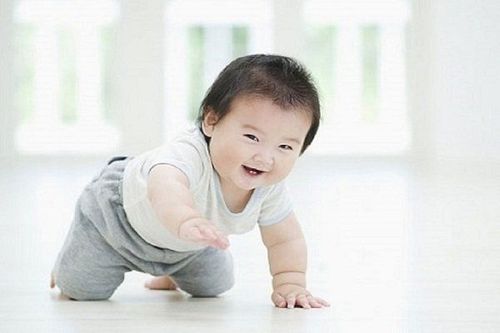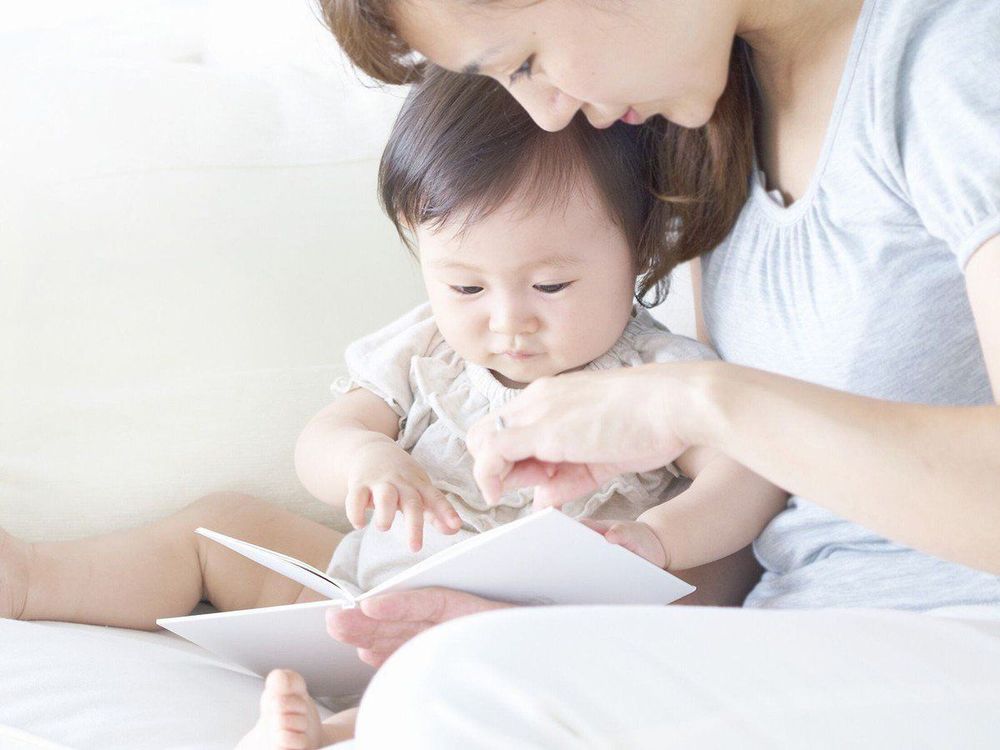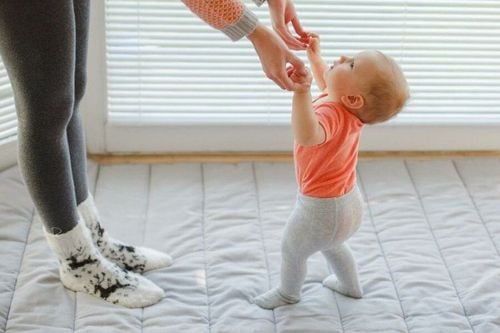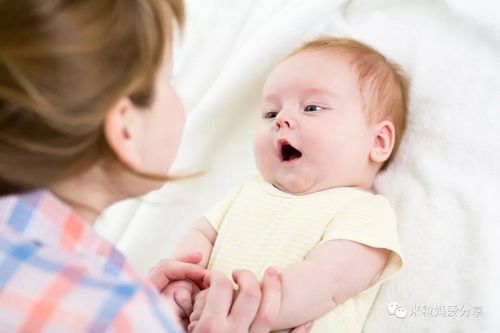This is an automatically translated article.
The article is professionally consulted by Master, Doctor Doan Ngoc Quynh Tram- Pediatrician - Neonatologist - Department of Pediatrics - Neonatology - Vinmec Nha Trang International General Hospital."When do children know when to talk" - is always the question that young parents are most concerned about. The child's language acquisition process is a long-term process from the time the child is still in the womb. The most important thing is that parents always keep a close eye on their child's developmental milestones to help them develop their language skills as well as their learning activities.
1. When does a child start talking?
Your baby will learn to speak in the first two years of life. Long before uttering their first word, babies learn the rules of language and how adults use it to communicate.Baby will start by using their tongue, lips, roof of their mouth, and any newly emerging teeth to make sounds (first a squeak, then an "um" and an "a" in one or two. first month and babbling shortly thereafter). Soon those sounds will become real words like "mama" and "baba" that can come out and make you super excited and emotional.
From there, the baby will absorb more words from you and everyone around. And sometime between 18 months and 2 years old, children will begin to form sentences with two words then four words. As your baby progresses mentally, emotionally, and behaviorally, he'll be able to use more and more words to describe what he sees, hears, feels, thinks, and wants.
Trắc nghiệm: Sự phát triển tinh thần, vận động của bé thế nào là đúng chuẩn?
Khi nào bé biết nói, biết hóng chuyện hay biết cầm cốc là "đúng chuẩn"? Điểm xem bạn biết được bao nhiêu mốc phát triển tinh thần, vận động "đúng chuẩn" của bé nhé!The following content is prepared under supervision of Thạc sĩ, Bác sĩ y khoa, Ma Văn Thấm , Nhi , Phòng khám Đa khoa Quốc tế Vinmec Dương Đông(Phú Quốc)
2. How children learn to speak
New parents are all concerned about when their baby can talk. The best way parents should do is to understand the child's developmental milestones and always accompany the baby such as playing with the baby, talking with the baby to help the baby develop language skills. If a baby is raised in a bilingual environment, language milestones often occur in both languages at the same time.2.1. While the baby is in the womb Many researchers believe that language comprehension begins when the baby is still in the mother's womb. Just as your baby gets used to the steady beat of your heart, he will hear your voice and be able to distinguish you from others.
2.2 Baby Stage to 3 Months Crying is your baby's first form of communication. And an unusual cry such as: A piercing scream could mean your baby is hungry. While the whimpers, possibly painful expressions, could signal that the baby needs a diaper change. As babies get older, they will develop an enjoyable activity that includes gurglings, sighs, and squeals.
In terms of language comprehension, babies begin to realize how words sound and how sentences are structured as they listen to those around them.
2.3. When your baby is between the ages of 4 and 6 months At this stage, your baby starts babbling, combining consonants and vowels (such as "baba" or "yaya"). By about 6 months, your baby may be able to respond to her own name or she may be able to speak earlier.
You may hear "mama" or "baba" first as soon as your baby starts to want to say it later. While it's sure to melt your heart, your baby still hasn't fully conveyed those words to you. That can come later, when the baby is almost a year old.
Your baby's attempts to talk will be like stream of consciousness monologues in another language with countless words strung together. Vocalization is a game for your baby, who is experimenting with using her tongue, teeth, palate and vocal cords to make all sorts of fun sounds.
At this stage, the babbling sounds are the same, whether you speak Vietnamese, English, French or Japanese... You may notice your baby likes certain sounds (like "ghost") or "ba"), repeating them over and over because your baby likes the way they sound and the way your mouth feels when you speak.

2.5. When your baby is between the ages of 13 and 18 months Baby is using one or more words now, and she knows what these words mean. Your baby will even practice her tongue curling skills, raising her voice when asked questions, for example when she wants to be held. Babies realize the importance of language as they harness the power of communicating their needs.
2.6. When your baby is between the ages of 19 and 24 months Even though your baby may say less than 50 words, your baby now understands more than they can say. And babies absorb more words every day, so help them increase their language through daily conversation with them. Babies can even string two words together, forming basic sentences like "Carry me."
By 2 years old, baby can use sentences of two to four words and sing simple rhymes. As her sense of self matures, the baby will begin to talk about what she feels like and dislikes, what she thinks and feels.
2.7. When your baby is between the ages of 25 and 36 months Your baby may have a hard time finding the right volume to use when talking, but she'll soon learn this. Babies are also starting to get used to pronouns, such as "I", "you" and "you".
Between the ages of 2 and 3, your baby's vocabulary continues to expand and he understands most of what you say to them. Your baby will string nouns and verbs together to form simple sentences.
By the time your child is 3 years old, your child can be a fairly flexible talker. Your baby will be able to carry on long conversations and you will be able to understand most of what they say. Babies will even be complacent when you ask them to do several things at once, such as "Get the book and put it on the bookshelf."
3. How to help your baby talk
You can help your child with language skills by providing a rich communication environment. But the most important thing to do:Talk. You don't have to chat non-stop, but talk to your baby whenever you're together. Describe what you are doing, point things out, ask questions and sing songs. (Just use clear, simple speech. Your child learns to speak well by hearing you speak well.)

4. What to do if the baby won't talk
You are the best person to assess your child's speech development. If your child has any of the signs listed below or you are concerned about a possible language delay or hearing problem, talk to your pediatrician to find out the cause and solution. remedy.To help children achieve important milestones, in addition to nutrition, parents should supplement children with supporting products containing lysine, essential micro-minerals and vitamins such as zinc, chromium, selenium, vitamins. Group B helps to fully meet the nutritional needs of children. At the same time, these essential vitamins also support digestion, enhance nutrient absorption, help improve anorexia, help children eat well, and develop comprehensively.
Please regularly visit Vinmec.com website and update useful information to take care of your baby and family.
Article referenced source: babycenter.com















